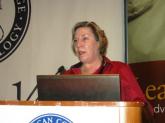The oral factor Xa inhibitor apixaban is now approved for the treatment of deep vein thrombosis and pulmonary embolism, and for reducing the risk of recurrent DVT and PE following initial treatment, the manufacturers have announced.
This approval is based on the results of the AMPLIFY and AMPLIFY-EXT studies, according to the statement issued by Bristol-Myers Squibb and Pfizer Aug. 21.
Apixaban, initially approved in 2012 and marketed as Eliquis, is already approved for reducing the risk of stroke and systemic embolism in patients with nonvalvular atrial fibrillation and for the prophylaxis of DVT, "which may lead to PE," after hip or knee surgery. The recommended dose for the treatment of DVT and PE is 10 mg twice a day for 7 days, followed by 5 mg twice a day. The recommended dose for reducing the risk for recurrent DVT and PE, after initial therapy, is 2.5 mg twice a day.
AMPLIFY was a noninferiority study of about 5,200 patients with symptomatic DVT or PE. It compared apixaban (10 mg twice a day for 1 week, followed by 5 mg twice a day for 6 months) with standard care using enoxaparin (1 mg/kg administered subcutaneously twice a day for at least 5 days [until the international normalized ratio was at least 2], followed by warfarin for at least 5 days [target INR range of 2.0-3.0] for 6 months). The primary efficacy endpoint, a composite of recurrent symptomatic VTE or VTE-related death over 6 months, was comparable in the two groups: 2.3% among those on apixaban and 2.7% among those on enoxaparin/warfarin, according to the prescribing information.
The primary safety endpoint, major bleeding, was 0.6% among those on apixaban vs. 1.8% among those on enoxaparin/warfarin, a statistically significant difference. Rates of clinically relevant nonmajor bleeding, a secondary safety endpoint, was 3.9% among those on apixaban vs. 8% among those on enoxaparin/warfarin.
In Amplify-EXT, almost 2,500 patients who had received anticoagulant therapy for DVT and/or PE for 6-12 months and had not had a recurrent event were randomized to treatment with apixaban 2.5 or 5 mg twice a day, or placebo, followed for a mean of almost 1 year. The rate of recurrent VTE or all-cause death was 3.8% among those on 2.5 mg twice daily and 4.2% among those on 5 mg twice daily, vs. 11.6% among those on placebo; the effects of both doses were significantly more effective in reducing risk than was placebo.
In this study, the rate of bleeding-related adverse reactions was 13.3% among those on apixaban vs. 8.7% among those on placebo. The rate of major bleeding was 0.2% among those on the 2.5 mg twice-daily dose and 0.1% among those on the 5 mg twice-daily dose, vs. 0.5% among those on placebo.
The apixaban label includes a boxed warning about an increased risk of spinal/epidural hematoma in patients undergoing neuraxial anesthesia or spinal puncture while on the drug.
Serious adverse events associated with apixaban should be reported to the FDA’s MedWatch program.
emechcatie@frontlinemedcom.com
